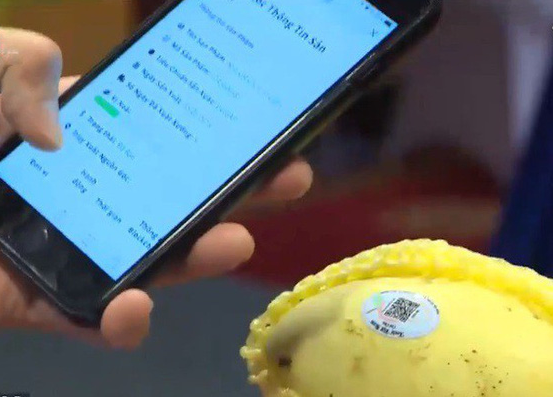Information can be safely stored on the blockchain, but the problem in Vietnam is that input is done manually, thus prone to human error
A Vietnamese agriculture cooperative is pioneering the use of the blockchain to improve traceability for its mangos, an advanced approach that will face several obstacles if adapted for large-scale application due.
Blockchain, the backbone technology of cryptocurrencies like Bitcoin, is considered an ‘incorruptible’ digital ledger of economic transactions which can be programmed to record financial transactions and virtually all kinds of valuable data.
This is why My Xuong, a renowned agriculture cooperative which produces mango in the Mekong Delta province of Dong Thap, chooses to store all crucial information related to its fruits on the blockchain in order to ensure tracability and fight against copycats.
Applying blockchain to mango production
My Xuong, a well-established cooperative, has been exporting mango under the registered trademark of Cat Chu, but fake products bearing forged Cat Chu stamps are rampant on the market, resulting in the company’s high quality mangoes being sold in batches with bad copycats.
To avoid a loss in revenue and reputation, five months ago, deputy director of My Xuong Bui Minh Can met with the representatives of Infinity Blockchain Labs (IBL), a visionary R&D company engaged in intermediary and regulatory technologies services employing blockchain technology.
The meeting resulted in My Xuong adopting the blockchain technology to allow the company to trace the origin of a batch of 500 mangos.
The project was introduced at Vietnam Blockchain Summit 2018 on Friday last week.When the mangos are still on the tree, still smaller than the size of two fingers, farmers cover them with bags to protect them from insects.
Forty-five days later, farmers begin their harvest.
“They unwrap the fruits one by one and check if they meet standards,” Can said at the summit according to tech news website ICTNews.
“The mangos are then transported to the cooperative, where they had their peduncle cut off, are treated with hot water, and dried. Then they are stamped, wrapped, and packaged,” he continued.
"The stamp represents all of the blockchain, information about the mango.
“Consumers who scan the stamp can see such information as how to use the mango, whether the mango tastes sweet or sour, and if the fruit is ready to eat,” he explained.
How advanced is blockchain?
Blockchain, which remains largely associated with cryptocurrencies, not only helps ensure secure transactions, but provides the source trail of a product. All of the records of ownership and movement are digitally held in blocks of data.
The stamp designated on each mango, scannable via a QR code, in fact store all information during their production, from post-harvest to transport, using blockchain, according to Do Van Long, Director of Strategy of IBL.
The protocol of the blockchain does not allow for any block of data to be deleted or edited, which secures all the information being stored.
“Through the blockchain management system, when the mangos are ‘shipped’ out of an establishment, we can update its information on the blockchain,” Long said.
When the mangos reach a buyer, that agent can access the fruit information via the blockchain, and update the system to show its been received.
“All of the data is transparent in the blockchain and it is impossible to forge,” Long explained.
Hard to spread in large scale in Vietnam
Long said one of the biggest advantages of the blockchain is that it helps clarify information.
“So when we detect something fake, we can use blockchain to trace the product and see where its been in order to narrow down the scope of our search,” Long explained.
He underlined that blockchain itself is not an anti-counterfeiting technology, and only helps deal with origin traceability.
He also admitted that the technology does not live up to its full potential, given the underdeveloped infrastructure in Vietnam.
"If the mango is grown in a standard Japanese greenhouse, the monitoring of temperature, air, humidity, fertilizer, and other tasks can be conducted by IoT [Internet of Things] devices, ensuring detailed and accurate information,” he said.
However, in Vietnam all processes are manually implemented by the farmers, meaning the input information is prone to human errors.
“So the transparency of initial data is entirely dependent on farmers,” Long said.
This brings about the risk of inaccurate data being validly stored on the blockchain, making it hard to trace back which part of the production chain is to blame when something goes wrong.
Though blockchain shows great advancement for agricultural application, Vietnam’s lack of infrastructure, such as Internet of Things, has made it extremely difficult to scale the technology for agricultural use across the country.

























































